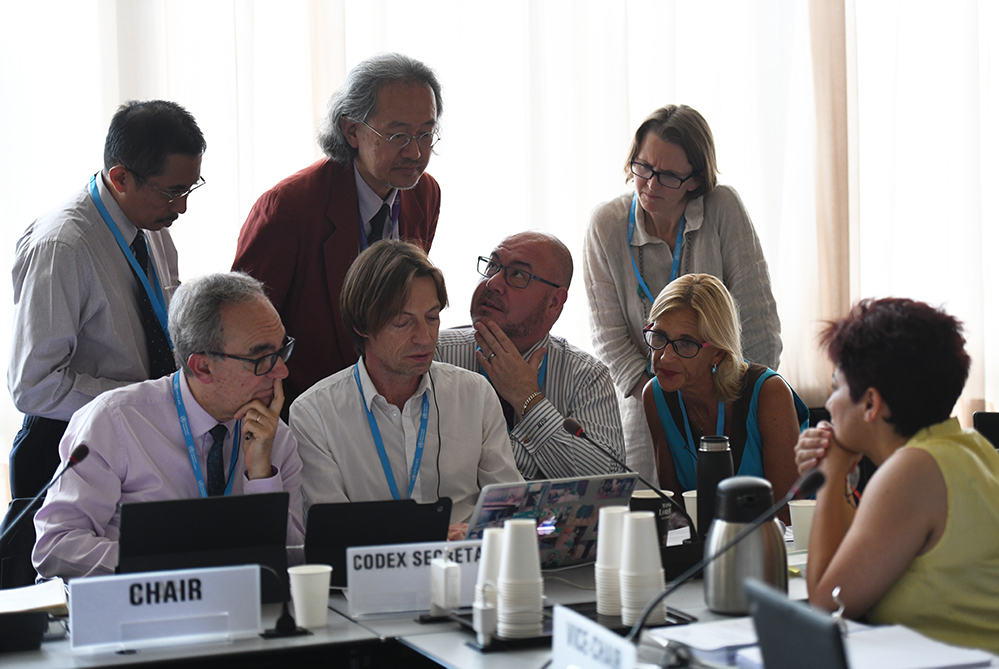Executive Committee completes strategic plan and faces key discussions on the role of science
As an expected 800 delegates gather in Geneva, Switzerland for the 42nd Codex Alimentarius Commission, 8-12 July 2019, recommendations from the Executive Committee (CCEXEC) include a final draft of the Codex Strategic Plan 2020-2025 and a pathway to discuss the role of science in standard setting.
Three days of debate in CCEXEC held at WHO headquarters in Geneva have culminated in agreement on recommendations for adoption of new and revised Codex texts including draft guidelines for rapid risk analysis following instances of detection of contaminants in food where there is no regulatory level; maximum levels for contaminants and residues of pesticides, and a series of food additive provisions. The committee, chaired by Guilherme da Costa of Brazil, assisted by three vice-chairpersons and with a committee of 13 experts, representative of the global Codex membership, also recommended that the Commission approve new work on allergen labelling; guidance on e-commerce; guidelines for compounds of low public health concern that could be made exempt from the need for maximum residue levels, and for STEC, a group of E. coli that produce Shiga toxin which can cause stomach cramps and diarrhea.

Chairperson da Costa (font row left) guiding consultations with vice-chairpersons, WHO and the Codex Secretariat
Where the world comes together
Strategic planning for the period 2020-2025 has been at the centre of CCEXEC work over the past 12 months and following the widest ever consultation of its membership a final text will be presented for adoption at the Commission. With clearly focused objectives the plan also incorporates a new goal to promote the relevance and use of Codex standards, recognizing their fundamental role in trade facilitation. The streamlined plan addresses new opportunities and challenges for Codex Members in an ever more globalized food system and allows for all countries to participate in building regional workplans to reflect specific areas where public health concerns and fair practices in food trade need to be addressed.
Science is golden
CCEXEC is also where Codex debates the most challenging issues before bringing them to the Commission and at this session board members examined how best to start discussions on the Statements of Principle Concerning the Role of Science and more specifically how chairpersons of Codex committees should proceed in meetings when there is agreement on the science supporting a Codex standard but differing views about other considerations. At the heart of the debate are the seven occasions since 1991 when the Commission has voted on the use of growth promoting substances, namely Bovine somatotropin (bST) and Ractopamine. Voting in Codex, the Joint FAO/WHO Programme that lists consensus-building as a core value, is often seen as divisive hence the decision to embark on a full examination of how to guide committees when they reach an impasse.
All decisions and recommendations made by the Executive Committee are subject to approval by the Commission, which gets underway at the CICG Conference Centre in Geneva on 8 July 2019.
Read more
- Report of CCEXEC77
- The history of paragraph 4 of the statements of principle on the role of science and the extent to which other factors can be taken into account
- The agenda and working papers of CAC42
Photo credit
(c)FAO/Bob Scott
Categories
- (11)
- (19)
- (15)
- (3)
- Animal Feed (8)
- Antimicrobial Resistance (43)
- Antimicrobial Resistance (84)
- Codex Texts (18)
- Codex Trust Fund (1)
- Contaminants (13)
- Contaminants (10)
- COVID-19 (64)
- Elections (6)
- Food Safety (130)
- Labelling (12)
- Monitoring (9)
- Nutrition and Labelling (6)
- Nutrition and Labelling (7)
- Observers (26)
- Pesticides (9)
- Standards (82)
- World Food Safety Day (162)


